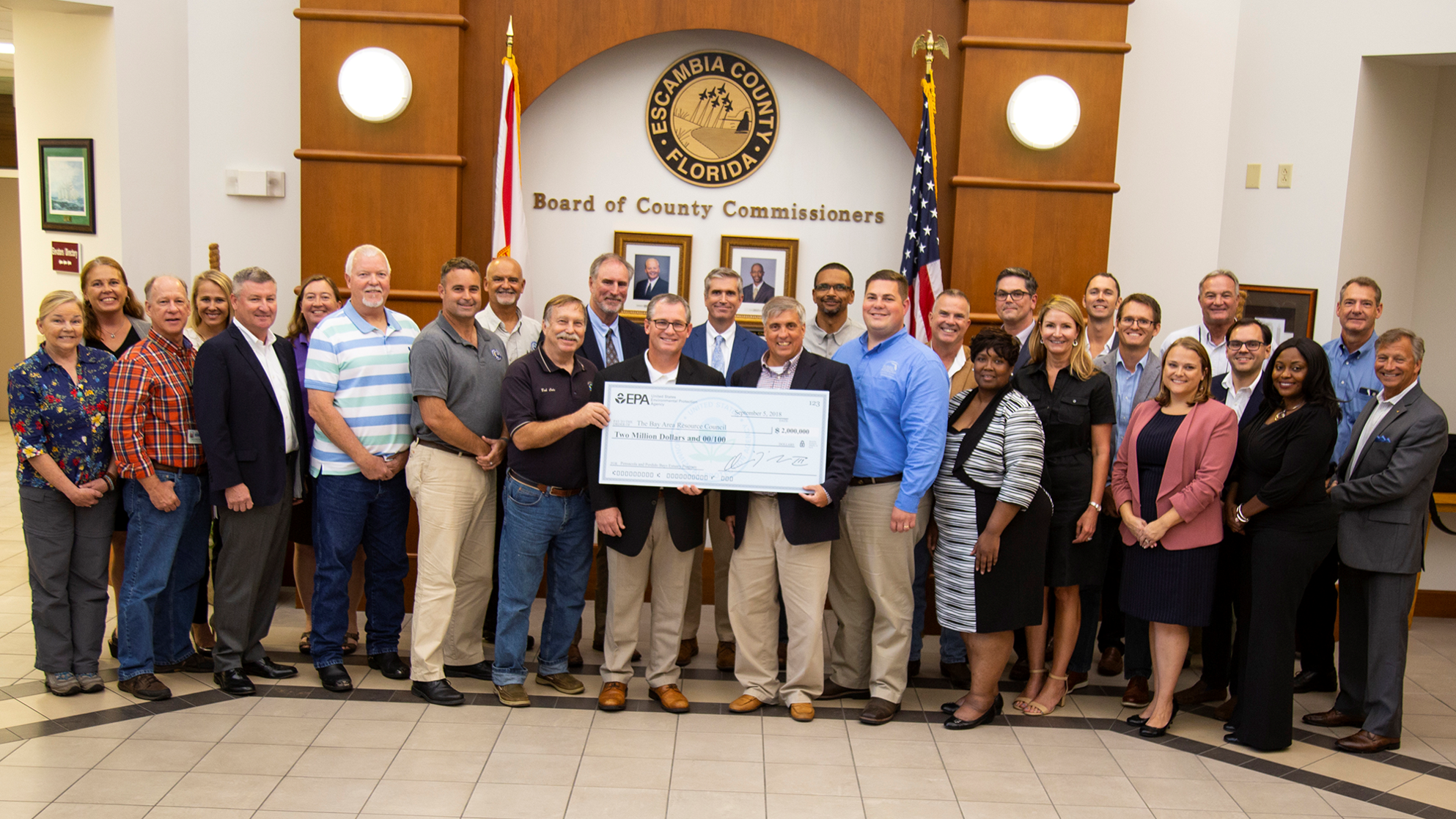


Thanks to the work of many dedicated partners, the Bay Area Resources Council (BARC) transitioned into the Pensacola and Perdido Bays Estuary Program in 2018 after securing a $2 million competitive grant from the Gulf Coast Ecosystem Restoration Council and the U.S. Environmental Protection Agency Gulf of Mexico Program.
In 2020 our program was awarded $297,220 from the EPA to identify and mediate potential sources and contributors of water-borne trash in three creeks of the Pensacola Bay System: Jones Creek in Escambia County, Carpenter Creek in the City of Pensacola and Pond Creek in northern Santa Rosa County. Water-borne trash is a global issue, with far reaching consequences and impacts; however, the problem starts in local waterways, parking lots and roads. Trash-clogged creeks and streams aren’t just ugly, they pose serious health and safety risks. This project will heavily engage the community in trash removal and prevention, engage local businesses, existing grassroots efforts and area schools to reduce water-borne trash and improve the safety, health and beauty of local creeks.
The program was awarded $500,000 in Florida legislative appropriations to 1) support the development of our CCMP, 2) enhance monitoring in the Pensacola and Perdido bay systems through the establishment of comprehensive monitoring program, and 3) implement water quality improvements, habitat restoration, resilience, citizen science, research, and education and outreach projects of the program and partnering agencies and organizations through the establishment of the PPBEP Mini-Grant Program. We offer our deepest appreciation to Representative Andrade and Senator Broxson for sponsoring the Program’s legislative funding request.
Santa Rosa County, in collaboration with the Pensacola & Perdido Bays Estuary Program, received a National Coastal Resilience grant for $73,910 to develop a living shoreline habitat suitability model and master plan for the Pensacola Bay System. The project will assess approximately 175 miles of shoreline to evaluate land use, water depth, habitat type, wave dynamics, sediment transport, and the presence or absence of hardened coastal infrastructure (i.e. sea walls).
Living shorelines are softer, greener alternatives to stabilize shorelines from erosion, sea level rise, and other damage through the installation of native plants, oyster shells, and other organic materials. They protect and restore natural shoreline habitat, trap sediments, improve water clarity, filter pollutants, provide recreational opportunities, and provide important fish and wildlife habitat. In the aftermath of Hurricane Sally, our communities are seeing the success of existing living shoreline projects over hardened infrastructure such as sea walls. The Pensacola Bay System project will create a model to characterize and prioritize living shoreline opportunities across local government jurisdictions, as a comprehensive coastal resilience strategy.
The program was awarded $250,000 in Florida legislative appropriations to continue our Community Grant Program. We offer our deepest appreciation to Representative Andrade and Senator Broxson for sponsoring the Program’s legislative funding request.
Researchers at the University of New Orleans in partnership with the PPBEP and Mississippi State University received funding from the National Oceanic and Atmospheric Administration’s (NOAA) Actionable Science Program to develop a strategic plan for seagrass restoration in the Pensacola and Perdido Bays. This project aims to reduce the unknowns of restoration success by focusing on the benefits of genetic diversity (range of different inherited traits within a species). The plan that is developed collaboratively with the project team, an advisory panel of experts and practitioners, and community stakeholders will assist in the critical management decisions related to the restoration of seagrass beds, dominated by shoal grass (Halodule wrightii), in the Pensacola and Perdido Bays for resiliency to climate stress.
In November 2021, the PPBEP secured funds from the Mississippi-Alabama Sea Grant Consortium, NOAA’s Office for Coastal Management, and the Gulf of Mexico Climate and Resilience Community of Practice (CoP) to develop a climate adaptation project with local communities at risk that will serve as an example for other communities across the Gulf of Mexico (GoM). A main element of the project will be developing and administering resilience readiness surveys in selected communities within city limits of Pensacola, Florida. Citizens’ perceptions of vulnerable and resilient areas of the community will be visualized using sketch mapping activities.This project will compile, analyze, and package the survey data so it can be incorporated into the City of Pensacola’s Sea Level Rise Vulnerability Assessment tool.